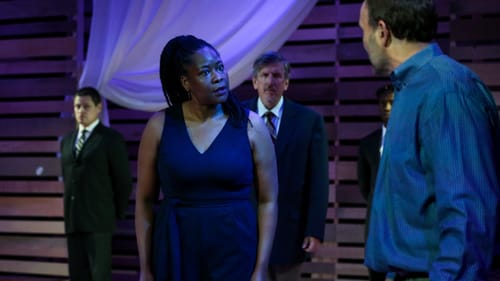Stay in the Loop
BSR publishes on a weekly schedule, with an email newsletter every Wednesday and Thursday morning. There’s no paywall, and subscribing is always free.
Staging a dud
Curio Theatre Company presents Shakespeare’s ‘The Winter’s Tale’

Stephen Sondheim’s Anyone Can Whistle closed after nine performances. The Coen Brothers might have four Oscars, but their film The Ladykillers is firmly “rotten” on Rotten Tomatoes. Paul McCartney wrote “Wonderful Christmastime.” Some of the best artists of all time have managed to produce some duds, Shakespeare included—as Curio’s The Winter’s Tale now reminds us.
Shakespeare isn’t always easy to begin with, and Winter’s Tale is just not a good play. Which means that Curio Theatre Company has two barriers to overcome with its current production: the Bard generally, and this play specifically. They tackle both with mixed results.
Young love, mistaken identity (again)
The play’s love-story plot centers around Perdita (Tessa Kuhn) and Florizel (Mark Christie). Florizel’s father, Polixenes (Rich Bradford) is the king of Bohemia, but Perdita is the daughter of a poor shepherd (Len Kelly)…or so everyone thinks. Perdita actually wound up as the shepherd’s ward after being abandoned at the behest of her father, Leontes (Paul Kuhn), the king of Sicily, who suspected his wife of infidelity and demanded the child be sent away. (The show’s famous “Exit pursued by a bear” stage direction happens as Perdita is being left near Bohemia by her father’s servant, also played by Kelly).
As with any Shakespearean love story, the young pair is deeply, desperately in love and desire to marry, despite having known each other for only a few days. And of course, because nobody knows that Perdita is actually noble, the marriage must be thwarted before it can ultimately proceed. We’ve been here before with the Bard, and compared to other similarly plotted plays, the lead-up to and the discovery that Perdita is actually a princess falls flat. This isn’t the fault of the Curio production but of the source material.
There are at least two other subplots thrown into the play, but I’ll leave those for you to discover when (if) you go see Winter’s Tale… or at least when you read the play’s Wikipedia page.
On our feet
The Winter’s Tale is the third Shakespeare play I’ve reviewed in as many months and the second to involve more than one playing space. The audience is transported from the main theater—complete with a beautiful multilevel set by Paul Kuhn—to an outdoor beer garden (which is open for business before each production), with a brief stop under a balcony for sixteen years’ worth of exposition.

I happened to catch the show on a cold and dreary April night, so I wasn’t particularly excited about the prospect of sitting outside. But the Curio team thoughtfully stocked up on blankets and sweatshirts and handed them to the audience as we entered the charmingly shabby-chic beer garden designed by doug greene (who was involved with me several years ago in the Vagabond Acting Troupe).
It helps that the scenes played out in the beer garden are among the show’s most engaging, with greene (who also plays Clown in the show and serves as the audience’s escort between the two stages) interacting with the audience to mediate a sheep-pun competition and the entire cast encouraging the audience to dance to Mariah Carey with them. As memorable as the interior set is, if you ask me six months from now what I can still recall of this production of The Winter’s Tale, it will almost certainly be the time spent outdoors.
Talking the talk
Shakespeare might be considered one of the greatest writers in the English language, but his English is awfully different from ours—a struggle even for some great actors.
Philadelphia is blessed with dozens of actors fluent in Shakespeare. And much of this cast tackles the Elizabethan English handily. (Tessa Kuhn, Christie, and Ebony Pullum especially stand out.) But the actors playing the two characters who most drive the action of the play—Paul Kuhn as Leontes and Bradford as Polixenes—were hard to hear, sounding like they were chewing the words before they finally made it out. Both of these performers are seasoned actors, but Shakespeare seems beyond their comfort zone.
For a play like The Winter’s Tale to really work, a production has to be more perfect than the play is flawed. While the Curio production has many perfect moments, the play’s flaws are still front and center.
What, When, Where
The Winter’s Tale. By William Shakespeare, directed by Liz Carlson-Guerin. Through May 18, 2019, at Calvary Center for Culture and Community, 4740 Baltimore Avenue, Philadelphia. (215) 921-8243 or curiotheatre.org.
Sign up for our newsletter
All of the week's new articles, all in one place. Sign up for the free weekly BSR newsletters, and don't miss a conversation.

 Jillian Ashley Blair Ivey
Jillian Ashley Blair Ivey